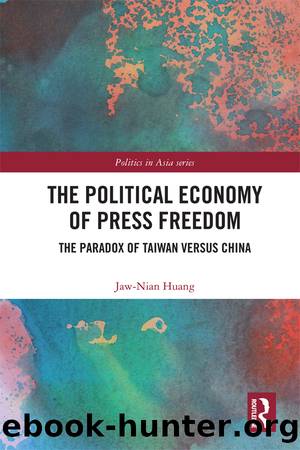The Political Economy of Press Freedom: The Paradox of Taiwan Versus China by Jaw-Nian Huang

Author:Jaw-Nian Huang [Huang, Jaw-Nian]
Language: eng
Format: epub
ISBN: 9781032090542
Google: mqplzgEACAAJ
Goodreads: 57868936
Publisher: Routledge
Published: 2021-06-30T12:22:07+00:00
Under this circumstance, the editorial department, which had been independent of the business department, was now forced to cooperate with the latter, either by producing media content in favor of advertising suppliers or by placing advertising information directly in news and programs.79 According to Chen Ping-Hungâs questionnaire survey based on 295 Taiwanese journalistsâ responses, there were 96.9% who have ever seen product placement or embedded marketing from the media, 93.5% who have ever heard their journalism colleagues practicing product placement, 60.2% who have ever practiced embedded marketing by themselves, and 17.1% whose routine task was just to practice product placement. Moreover, none of the journalists replied that their affiliated media companies never practiced embedded marketing.80 As Lin Chao-chen (æç §ç) noted in her special report on embedded marketing:
Some newspapers still prohibited the editorial department, news reporters, and editors from having direct contact with advertising salespeople; others were just indifferent. Some advertisers in commercial and industrial circles preferred to establish direct contact with the editorial department. Under such a circumstance, many news reporters at the basic level thought that the heads of the media looked much like people in business while editors-in-chief looked just like general managers⦠. Businesses shaped their own images or influenced government policies with embedded marketing. The more money they had, the more news space they were able to buy, the more they held the right to speak through the media.81
Take the Farglory Group (é ééå) for example. It was the largest construction company in Taiwan which had even served as the biggest advertising contributor in Taiwan from 2006 to 2010. When its President Chao Teng-Hsiung (è¶è¤é) was detained for a bribery case in June 2014, most media were reluctant to report relevant news intensively and critically at first, to avoid any possible reduction of advertising from such a large conglomerate.82 Apparently, the increasing advertising revenues from private businesses caused a significant impact on the mediaâs editorial independence and news impartiality in Taiwan.
Download
This site does not store any files on its server. We only index and link to content provided by other sites. Please contact the content providers to delete copyright contents if any and email us, we'll remove relevant links or contents immediately.
Cecilia; Or, Memoirs of an Heiress — Volume 1 by Fanny Burney(32549)
Cecilia; Or, Memoirs of an Heiress — Volume 2 by Fanny Burney(31948)
Cecilia; Or, Memoirs of an Heiress — Volume 3 by Fanny Burney(31932)
The Great Music City by Andrea Baker(31917)
We're Going to Need More Wine by Gabrielle Union(19035)
All the Missing Girls by Megan Miranda(15962)
Pimp by Iceberg Slim(14489)
Bombshells: Glamour Girls of a Lifetime by Sullivan Steve(14058)
For the Love of Europe by Rick Steves(13948)
Talking to Strangers by Malcolm Gladwell(13350)
Norse Mythology by Gaiman Neil(13349)
Fifty Shades Freed by E L James(13233)
Mindhunter: Inside the FBI's Elite Serial Crime Unit by John E. Douglas & Mark Olshaker(9324)
Crazy Rich Asians by Kevin Kwan(9280)
The Lost Art of Listening by Michael P. Nichols(7494)
Enlightenment Now: The Case for Reason, Science, Humanism, and Progress by Steven Pinker(7306)
The Four Agreements by Don Miguel Ruiz(6745)
Bad Blood by John Carreyrou(6612)
Weapons of Math Destruction by Cathy O'Neil(6267)
